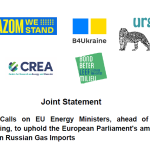According to the Climate Change Performance Index 2020 (CCPI), published today at the climate summit COP25, the EU lost six ranks due to its failure to increase its 2030 climate target.
The CCPI which is published by Germanwatch, NewClimate Institute and the Climate Action Network (CAN) evaluates the efforts of 57 countries and the EU to reduce greenhouse gas emissions, increase renewable energy and limit energy use. The report is an important tool to provide a comparison of the climate performance of countries which are together responsible for more than 90% of global greenhouse gas emissions.
The EU as a whole ranks 22nd, losing six places compared to last year, mostly due to its weak domestic and international climate policy performance.
Commenting on the CCPI results for the EU, Wendel Trio, Director of Climate Action Network (CAN) Europe said:
“To increase the EU’s ranking and for the bloc to regain its leadership role, the EU must urgently and substantially increase its 2030 climate target. Therefore one of the main benchmarks of the European Commission’s Green Deal proposal will be its ability to come up with a proposal for a new 2030 target within its first 100 days in office. Today, citizens, businesses, local authorities and trade unions are calling for this to happen soon. Closing eyes and ears to this call and missing the Paris Agreement’s 2020 deadline to increase the EU’s climate pledge will be disastrous for our planet and future, as well as for the EU’s image as international climate leader.”
EU Member States who rank under “high performers” include Sweden (rank 4), Denmark (rank 5), the United Kingdom (rank 7), Lithuania (rank 8), Finland (rank 10), Luxembourg (rank 13), Malta (rank 14) and Latvia (rank 15)[1]. Compared to last year, Denmark has improved by 10 places due to national policy changes including the adoption of a national climate law, a 70% emission reduction target by 2030 and an official coal-phase out target.
Poland replaces Ireland and becomes the worst performing EU Member State due to its increase of greenhouse gas emissions and low level of investments in renewable energy. Poland is also criticised for its opposition to the adoption of climate neutrality by 2050 objective by the EU of and its plans to open new coal mines.
Experts also acknowledge that the year 2020 represents an important opportunity for both the EU and Poland to go higher in the Index. If the EU could substantially increase its 2030 climate target ahead of COP26 and make use of the National Energy and Climate Plans (NECPs) to implement its energy targets, the EU can go substantially higher in the Index. It is also noted that the recently established Polish Climate Ministry could play a crucial role for the country to increase its share of renewable energy and ensure higher climate ambition.
On a positive note, the report underlines the fall in global coal consumption and the boom in renewable energy. It also notes that in the EU, 79% of coal generators are running at a loss of about €6.6 billion in 2019 alone and calls for a much faster coal-phase out. In this regard, the CCPI welcomes the European Investment Bank’s (EIB) announcement to stop financing fossil fuel energy projects from the end of 2021 and indicates this sets a benchmark for other multilateral banks.
ENDS
Notes
[1] In the ranking, the first three places on the ranking are kept empty due to the fact that no country at this moment is on track to contribute to a 1.5°C pathway.
The Climate Change Performance Index by Germanwatch and the NewClimate Institute published together with the Climate Action Network (CAN) is a ranking of the 57 countries and the EU, together responsible for about 90% of global GHG emissions. For the first time, the report covers Chile as the country hosts the international climate negotiations.
The four categories examined by national and international experts are: GHG emissions (40%), renewable energy (20%), energy use (20%) and climate policy (20%). While the report highly relies on the quantitative data produced by the International Energy Agency (IEA), PRIMAP, the Food and Agriculture Organization (FAO) and the national GHG inventories submitted to the UNFCCC; climate policy section is based on expert assessments by NGOs and think tanks from the respective countries. The CCPI also evaluates to what extent the respective countries are taking adequate action within the categories emissions, renewables and energy use to being on track towards the global Paris-goal of limiting global warming to well below 2°C.
The first three places on the ranking are kept empty due to the fact that no country at this moment is on track to contribute to a 1.5°C pathway.
CAN Europe supports the publication and can comment on the assessment of the performance of European countries.
Contact:
Goksen Sahin, CAN Europe Communications Coordinator, goksen@caneurope.org, +32 468 45 39 20
Climate Action Network (CAN) Europe is Europe’s leading NGO coalition fighting dangerous climate change. With over 160 member organisations from 35 European countries, representing over 1.700 NGOs and more than 40 million citizens, CAN Europe promotes sustainable climate, energy and development policies throughout Europe.



